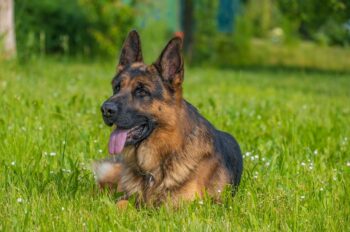Shutterstock
Service animals are vital in supporting individuals with disabilities, offering crucial assistance significantly enhancing their independence and quality of life. Choosing the appropriate dog breed for service work is essential, as the dog must exhibit key traits like intelligence, trainability, and a calm demeanor. These qualities are necessary for the dog to perform its duties efficiently and navigate various public settings with ease and composure, ensuring the animal and its handler remain at ease in any situation.
Labrador Retriever
Shutterstock
Labrador Retrievers are often the first choice for many service animal roles, including those assisting individuals with visual impairments and autism and those requiring diabetic alert and seizure response services. Labs are known for their friendly, outgoing nature and stable temperament, making them excellent in situations where a non-reactive companion is essential. They are eager to please and can be trained to perform various tasks, from providing physical support to retrieving items and alerting to medical emergencies. Their strong swimming ability and love for retrieving also make them particularly effective for people with mobility issues.
Golden Retriever
Shutterstock
Golden Retrievers are widely recognized for their gentle disposition and patient nature, making them ideal for therapeutic settings and as emotional support animals. They are highly trainable, which is crucial for the varied demands of service work. Goldens excel in tasks that require them to be sensitive to their handler’s emotional state, such as those needed by individuals with PTSD or anxiety disorders. They have an innate ability to adapt their behavior to the needs of their handlers, providing comfort and stability in addition to performing physical tasks.
German Shepherd
Shutterstock
German Shepherds are valued for their intelligence and versatility as service animals. Originally bred for herding and guard duties, their protective instincts can be ideal for people needing a dog with a more assertive presence. German Shepherds are highly trainable and capable of performing complex tasks, making them suitable for roles such as mobility assistance, police work, and military applications. Their loyalty and ability to work under pressure also make them excellent companions for those with challenging physical or emotional needs.
Standard Poodle
Shutterstock
Standard Poodles are highly intelligent, easily trainable, and hypoallergenic, which is a critical consideration for individuals with allergies. Poodles excel in tasks requiring problem-solving and adaptability, and their gentle demeanor makes them suitable for therapeutic interactions. They are often used in psychiatric service roles, helping to manage conditions such as depression and anxiety. Poodles’ keen awareness and responsiveness to their environment make them excellent at navigating public spaces, an essential trait for any service animal.
Border Collie
Shutterstock
Border Collies are known for their extraordinary intelligence and work ethic, which makes them excellent candidates for service roles that require a high level of responsiveness and learning ability. They are particularly effective in seizure alert and response roles, where quick reactions are necessary. Border Collies’ intense focus and energy also make them suitable for active individuals who require a service dog that can keep up with demanding physical activities and provide vigilant monitoring of health conditions.
Boxer
Shutterstock
Boxers are known for their strong build and protective nature, making them particularly effective for mobility assistance and as guard dogs for those with disabilities. They are enthusiastic workers and form deep bonds with their handlers, which are crucial traits for a service animal. Boxers’ jovial and spirited disposition can also help lighten the atmosphere, benefiting handlers with emotional or psychological challenges. They are patient and watchful, always alert to their handlers’ needs and safety.
Bernese Mountain Dog
Shutterstock
Bernese Mountain Dogs are suited for service roles due to their strength, calmness, and gentle temperament. They are particularly effective for mobility assistance, capable of supporting weight and pulling wheelchairs, and their patient nature makes them excellent for therapeutic settings. Bernese Mountain Dogs are also known for their longevity in service roles, often working longer in their capacities due to their robust health and slow maturation rate.
Choosing the Right Service Dog Breed
Shutterstock
These breeds exemplify the ideal traits of service animals, combining physical strength, emotional sensitivity, and exceptional trainability. Their ability to perform crucial tasks while providing companionship and emotional support underscores service dogs’ profound impact on their handlers’ lives. Whether assisting with physical disabilities, offering emotional comfort, or ensuring safety, these breeds significantly improve the quality of life for individuals with disabilities. This showcases the remarkable bond between humans and dogs, reaffirming these animals’ vital role in society.
The post Top 7 Dog Breeds That Excel at Being Service Animals appeared first on iHeartDogs.com.

